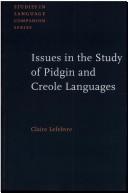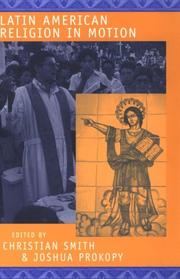| Listing 1 - 10 of 15 | << page >> |
Sort by
|
Book
ISBN: 2753581320 2753553661 Year: 2020 Publisher: Rennes : Presses universitaires de Rennes,
Abstract | Keywords | Export | Availability | Bookmark
 Loading...
Loading...Choose an application
- Reference Manager
- EndNote
- RefWorks (Direct export to RefWorks)
Ce livre s’intéresse au cosmopolitisme méconnu et pourtant ancien des villes d’Afrique au sud du Sahara, processus ravivé dans le cadre de la mondialisation depuis les années 1990. De ces mobilités et de ces échanges naissent des phénomènes de créolisation qui se traduisent dans l’alimentation, l’architecture ou les œuvres d’art. Des lieux de sociabilité se déploient et les citadins développent de nouveaux imaginaires, tournés vers l’ensemble du monde, qui témoignent de l’ouverture culturelle des sociétés urbaines.
Geography --- History --- 20th century --- Africa --- creolization --- créolisation
Book
ISBN: 0823273105 Year: 2016 Publisher: New York, NY : Fordham University Press,
Abstract | Keywords | Export | Availability | Bookmark
 Loading...
Loading...Choose an application
- Reference Manager
- EndNote
- RefWorks (Direct export to RefWorks)
The Decolonial Abyss probes the ethico-political possibility harbored in Western philosophical and theological thought for addressing the collective experience of suffering, socio-political trauma, and colonial violence. In order to do so, it builds a constructive and coherent thematization of the somewhat obscurely defined and underexplored mystical figure of the abyss as it occurs in Neoplatonic mysticism, German Idealism, and Afro-Caribbean philosophy.The central question An Yountae raises is, How do we mediate the mystical abyss of theology/philosophy and the abyss of socio-political trauma engulfing the colonial subject? What would theopoetics look like in the context where poetics is the means of resistance and survival? This book seeks to answer these questions by examining the abyss as the dialectical process in which the self’s dispossession before the encounter with its own finitude is followed by the rediscovery or reconstruction of the self.
Meaninglessness (Philosophy) --- Postcolonialism. --- Decolonization. --- Creolization. --- Edouard Glissant. --- Hegel. --- Middle Passage. --- coloniality. --- cosmopolitics. --- dialectic. --- negative theology. --- poetics.
Book
ISSN: 2267568X ISBN: 9782357681217 2357681217 2357681225 Year: 2021 Publisher: Avignon : Éditions Universitaires d’Avignon,
Abstract | Keywords | Export | Availability | Bookmark
 Loading...
Loading...Choose an application
- Reference Manager
- EndNote
- RefWorks (Direct export to RefWorks)
Cet essai interprète le théâtre d’Aimé Césaire au prisme de la fluidité textuelle, à travers une analyse des révisions, des réécritures et des traductions des pièces de l’auteur martiniquais. En considérant l’ensemble des versions publiée et inédites de l’œuvre théâtrale de Césaire et en s’intéressant tout particulièrement au rôle qu’y tiennent les langues, cette étude met en exergue l’importance de la collaboration entre Césaire, ses traducteurs et ses metteurs en scène. Au fil des pages, il est donc question du rôle et de l’influence joués par les mondes de la traduction dans la construction et la réception de toute œuvre. Voilà qui pourra ouvrir une authentique réflexion sur la littérature comme système complexe en évolution constante.
Césaire, Aimé --- Oeuvres --- Théâtre (genre littéraire) --- Traductions. --- Theater --- théâtre contemporain --- traduction --- créolisation --- Aimé Césaire --- teatro contemporaneo --- traduzione --- creolization --- contemporary theater --- translation
Book
ISBN: 3846759511 Year: 2019 Publisher: Paderborn, Deutschland : Wilhelm Fink Verlag,
Abstract | Keywords | Export | Availability | Bookmark
 Loading...
Loading...Choose an application
- Reference Manager
- EndNote
- RefWorks (Direct export to RefWorks)
Ist Assimilation eine reaktionäre Forderung? Der Band unterstreicht die analytische Fruchtbarkeit des Assimilationskonzepts und legt bisher vernachlässigte normative Gehalte frei.Anhand der jüdischen Assimilation und (post-)kolonialen Konstellationen werden Prozesse und Repräsentationen der Verähnlichung und Inkorporierung in ihrer Komplexität, Ambivalenz und Widerspenstigkeit untersucht. Assimilation erscheint dabei als politisches Geschehen, das nicht nur mit polemischen Äußerungsformen verbunden ist, sondern das Sprache selbst zum Gegenstand hat. Statt Eingliederung in eine Monokultur, so wird gezeigt, kann Assimilation auch reziprokes, nicht-hierarchisches Lernen bedeuten und besitzt damit ein interkulturelles Potenzial, das starre Grenzziehungen und Essentialisierungen aufbricht.
Jüdische Assimilation --- Kolonialismus --- Postkolonialismus --- Hybridität --- Kreolisierung --- Kosmopolitismus --- Akkulturation --- Integration --- Diversität --- Multikulturalismus --- Jewish assimilation --- colonialism --- postcolonialism --- hybridity --- creolization --- cosmopolitanism --- culturation --- integration --- diversity --- multiculturalism --- Political science.
Book
ISBN: 022663180X 9780226631806 9780226631639 Year: 2019 Publisher: Chicago : University of Chicago Press,
Abstract | Keywords | Export | Availability | Bookmark
 Loading...
Loading...Choose an application
- Reference Manager
- EndNote
- RefWorks (Direct export to RefWorks)
In the Caribbean island of Guadeloupe, the complex interplay between anticolonial resistance and accommodation resounds in its music. Guadeloupean gwoka music-a secular, drum-based tradition-captures the entangled histories of French colonization, movements against it, and the uneasy process of the island's decolonization as an overseas territory of France. In Creolized Aurality, Jérôme Camal demonstrates that musical sounds and practices express the multiple-and often seemingly contradictory-cultural belongings and political longings that characterize postcoloniality. While gwoka has been associated with anti-colonial activism since the 1960s, in more recent years it has provided a platform for a cohort of younger musicians to express pan-Caribbean and diasporic solidarities. This generation of musicians even worked through the French state to gain UNESCO heritage status for their art. These gwoka practices, Camal argues, are "creolized auralities"-expressions of a culture both of and against French coloniality and postcoloniality.
Popular music --- Postcolonialism and music --- History and criticism --- Political aspects --- History and criticism. --- Glissant. --- Guadeloupe. --- aurality. --- citizenship. --- creolization. --- music. --- nationalism. --- politics. --- postcolonialism. --- sovereignty.
Book
ISBN: 0823266125 0823266117 Year: 2015 Publisher: New York, NY : Fordham University Press,
Abstract | Keywords | Export | Availability | Bookmark
 Loading...
Loading...Choose an application
- Reference Manager
- EndNote
- RefWorks (Direct export to RefWorks)
Antiblack racism avows reason is white while emotion, and thus supposedly unreason, is black. Challenging academic adherence to this notion, Lewis R. Gordon offers a portrait of Martinican-turned-Algerian revolutionary psychiatrist and philosopher Frantz Fanon as an exemplar of “living thought” against forms of reason marked by colonialism and racism. Working from his own translations of the original French texts, Gordon critically engages everything in Fanon from dialectics, ethics, existentialism, and humanism to philosophical anthropology, phenomenology, and political theory as well as psychiatry and psychoanalysis.Gordon takes into account scholars from across the Global South to address controversies around Fanon’s writings on gender and sexuality as well as political violence and the social underclass. In doing so, he confronts the replication of a colonial and racist geography of reason, allowing theorists from the Global South to emerge as interlocutors alongside northern ones in a move that exemplifies what, Gordon argues, Fanon represented in his plea to establish newer and healthier human relationships beyond colonial paradigms.
Psychiatrists --- Revolutionaries --- Intellectuals --- Fanon, Frantz, --- Philosophy. --- Algeria --- Africana phenomenology. --- Africana philosophy. --- Black political thought. --- Existentialism. --- Frantz Fanon. --- Negritude. --- creolization. --- decolonial thought. --- dialectics. --- humanism. --- postcolonial thought. --- revolutionary thought.


ISBN: 3484304723 3111826457 3110948311 9783110948318 9783484304727 Year: 2013 Volume: 472 Publisher: Tübingen
Abstract | Keywords | Export | Availability | Bookmark
 Loading...
Loading...Choose an application
- Reference Manager
- EndNote
- RefWorks (Direct export to RefWorks)
This volume provides the reader with an update on the ongoing research in creole studies. The papers represent several lines of research in the study of Creole languages. Central issues in phonology, semantics, lexicon and syntax are addressed in various creole languages. These include Cape Verdean Creole, Haitian Creole, Lesser Antillean Creoles, Kriol, Saramaccan, and Sranan.
Creole dialects. --- Creole dialects --- Creole languages --- Creolisering --- Creolization --- Creolized languages --- Creools --- Creoolse dialecten --- Creoolse talen --- Créoles [Dialectes ] --- Créoles [Parlers ] --- Créolisation --- Dialectes créoles --- Kreools --- Kreoolse dialecten --- Parlers créoles --- Languages, Mixed --- Pidgin languages
Book
ISBN: 022650655X Year: 2017 Publisher: Chicago : University of Chicago Press,
Abstract | Keywords | Export | Availability | Bookmark
 Loading...
Loading...Choose an application
- Reference Manager
- EndNote
- RefWorks (Direct export to RefWorks)
Yoruba culture has been a part of the Americas for centuries, brought from Africa during the transatlantic slave trade and maintained in various forms ever since. In Oduduwa's Chain, Andrew Apter explores a wide range of fascinating historical and ethnographic examples and offers a provocative rethinking of African heritage in Black Atlantic Studies. Focusing on Yoruba history and culture in Nigeria, Apter applies a generative model of cultural revision that allows him to identify formative Yoruba influences without resorting to the idea that culture and tradition are fixed. For example, Apter shows how the association of African gods with Catholic saints can be seen as a strategy of empowerment, explores historical locations of Yoruba gender ideologies and their variations in the Atlantic world, and much more. He concludes with a rousing call for a return to Africa in studies of the Black Atlantic, resurrecting a critical notion of culture that allows us to transcend Western inventions of African while taking them into account.
Yoruba (African people) --- African diaspora. --- Cults --- Orisha religion --- Religion. --- Atlantic Ocean Region --- Nigeria, Southwest --- Religion. --- Religion. --- Black Atlantic. --- Brazilian Candomblé. --- Cuban Santería. --- Haitian Vodou. --- Yoruba-Atlantic. --- creolization. --- orisha worship.

ISBN: 9027230803 158811516X 9786613280282 9027281858 1283280280 9789027281852 9789027230805 9781588115164 Year: 2004 Volume: 70 Publisher: Amsterdam Benjamins
Abstract | Keywords | Export | Availability | Bookmark
 Loading...
Loading...Choose an application
- Reference Manager
- EndNote
- RefWorks (Direct export to RefWorks)
The content of this book is concerned with various issues at stake in Creole studies that are also of interest for general linguistics. These include the general issue of Creole genesis and of the accelerated linguistic change that characterizes the emergence of these languages as compared to ordinary cases of linguistic change, the problem of the development of morphology in incipient Creoles, the problem of the validity of data in linguistic analysis, the issue of multifunctionality as regards the concept of lexical entry, the question of whether Creole languages are semantically more transp
Creole dialects, French --- Creole dialects. --- Pidgin languages. --- Creole dialects --- Creole languages --- Creolisering --- Creolization --- Creolized languages --- Creools --- Creoolse dialecten --- Creoolse talen --- Créoles [Dialectes ] --- Créoles [Parlers ] --- Créolisation --- Dialectes créoles --- Hybrid languages --- Jargons --- Kreools --- Kreoolse dialecten --- Parlers créoles --- Pidgin languages --- Pidgins --- Pidgintalen --- Creolan languages --- French language --- Dialectology --- Contact vernaculars --- Pidgeon languages --- Pigeon languages --- Lingua francas --- Languages, Mixed --- Creole dialects [French ] --- Haiti --- PIDGIN (LANGUES) --- LANGUES CREOLES --- LANGUES CREOLES (FRANCAISES) --- HAITI --- Pidgin-English (langue) --- Langues créoles --- Langues créoles. --- Créole haïtien (langue)

ISBN: 1135962944 1280058781 0203010124 9780203010129 0415921058 9780415921053 9780415921060 0415921066 0415921066 9781135962890 9781135962937 9781135962944 1135962936 9781280058783 Year: 1999 Publisher: New York Routledge
Abstract | Keywords | Export | Availability | Bookmark
 Loading...
Loading...Choose an application
- Reference Manager
- EndNote
- RefWorks (Direct export to RefWorks)
This book examines some of the more important new analyses and discoveries about religious movements in Latin America.
Latin America --- Religion. --- 27 <8=6> --- 284 <8=6> --- 299.8 --- 299.8 Godsdiensten van de Inca's, Caraïben, Peruvianen --- 299.8 Godsdiensten van de precolombiaanse Zuidamerikaanse volkeren --- Godsdiensten van de Inca's, Caraïben, Peruvianen --- Godsdiensten van de precolombiaanse Zuidamerikaanse volkeren --- Kerkgeschiedenis--Latijns Amerika --- Protestantisme. Protestantse sekten--Latijns Amerika --- religion --- Latin American religion --- sociology --- Latin American studies --- pluralization of faith --- anthropology --- religious studies --- political science --- creolization --- esoterica --- Afro-Brazilian religion
| Listing 1 - 10 of 15 | << page >> |
Sort by
|

 Search
Search Feedback
Feedback About UniCat
About UniCat  Help
Help News
News